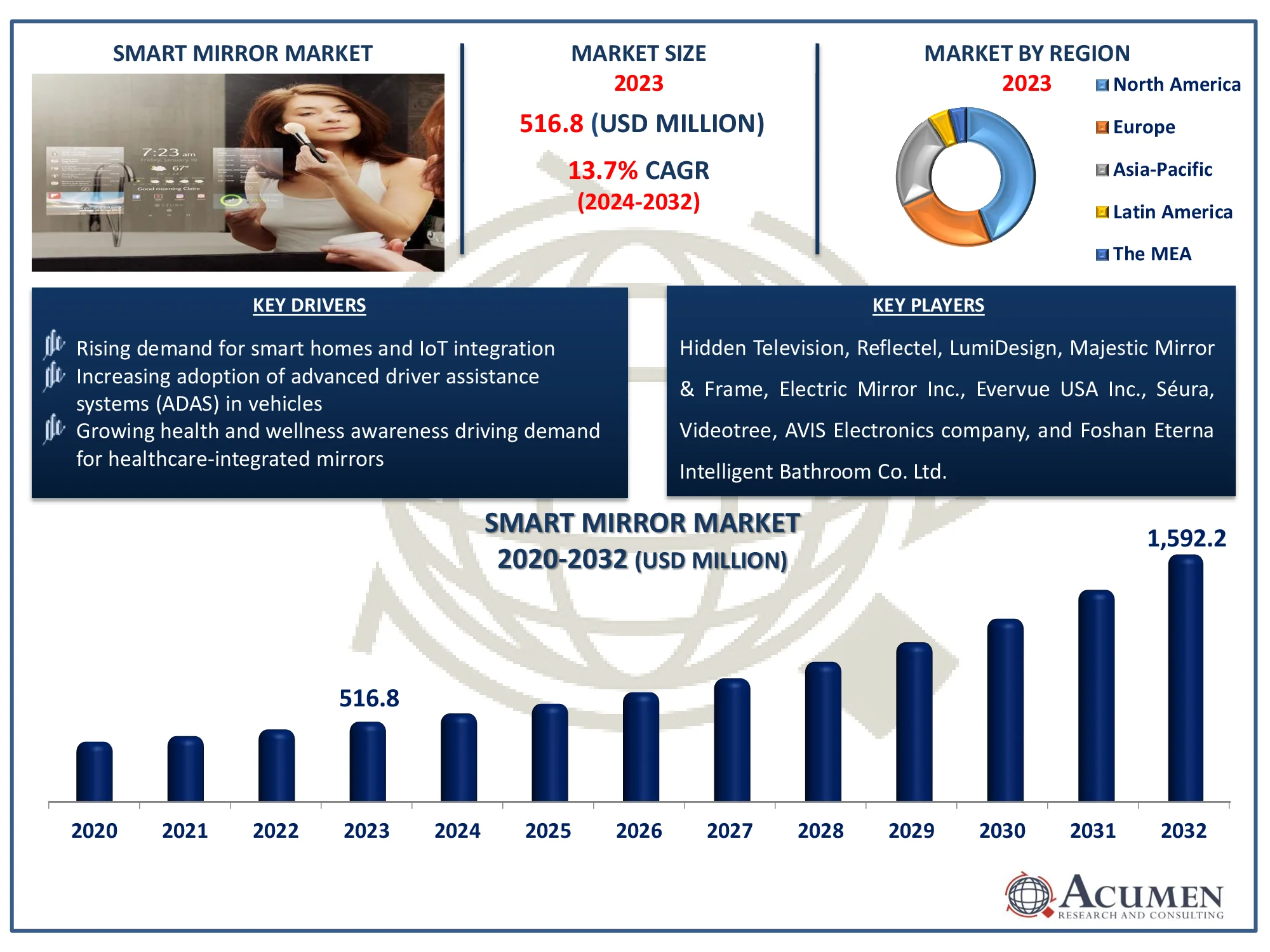Smart Mirror Market Size - Global Industry, Share, Analysis, Trends and Forecast 2024 - 2032
Published :
Report ID:
Pages :
Format :
Smart Mirror Market Size - Global Industry, Share, Analysis, Trends and Forecast 2024 - 2032
Report Coverage
- Industry Dynamics
- Market Size and Forecast Data
- Segment Analysis
- Competitive Landscape
- Regional Analysis with a Niche Focus on Country-Level Data
- High Level Analysis - Porter's, PESTEL, Value Chain, etc.
- Company Profiles of Key Players
- Option to Customize the Report As Per Your Specific Need
Request Sample Report
The Global Smart Mirror Market Size accounted for USD 516.8 Million in 2023 and is estimated to achieve a market size of USD 1,592.2 Million by 2032 growing at a CAGR of 13.7% from 2024 to 2032.
Smart Mirror Market Highlights
- The global smart mirror market revenue is expected to reach USD 1,592.2 million by 2032, growing at a CAGR of 13.7% from 2024 to 2032
- North America accounted for approximately USD 227.4 million of the smart mirror market value in 2023
- The Asia-Pacific smart mirror market is projected to grow at a CAGR of over 14.6% from 2024 to 2032
- The wall-mounted installation type dominated the market with an 80% share in 2023
- The automotive application sub-segment held 49% of the market share in 2023
- Integration of augmented reality (AR) technology for enhanced user experiences is the smart mirror market trend that fuels the industry demand

Smart mirrors are mirrors that include connectivity features and are connected to a variety of electronic devices. These mirrors are widely utilized in the auto, retail, and healthcare industries. They are integrated with other simple gadgets to make them smarter and more connectable. The expansion of the smart mirrors market is very plausible due to the impending smart applications, which have led to the development of smart gadgets controlled via mobile applications. The smart mirrors feature touch screen technology and are user-friendly and simple to operate.
Global Smart Mirror Market Dynamics
Market Drivers
- Rising demand for smart homes and IoT integration
- Increasing adoption of advanced driver assistance systems (ADAS) in vehicles
- Growing health and wellness awareness driving demand for healthcare-integrated mirrors
Market Restraints
- High initial costs limiting adoption in budget-sensitive markets
- Concerns about data privacy and cybersecurity risks in connected mirrors
- Limited awareness and accessibility in emerging regions
Market Opportunities
- Expansion into hospitality and luxury retail sectors
- Integration with AI for enhanced personalization and functionality
- Development of cost-effective smart mirror solutions for mass markets
Smart Mirror Market Report Coverage
|
Market |
Smart Mirror Market |
|
Smart Mirror Market Size 2023 |
USD 516.8 Million |
|
Smart Mirror Market Forecast 2032 |
USD 1,592.2 Million |
|
Smart Mirror Market CAGR During 2024 - 2032 |
13.7% |
|
Smart Mirror Market Analysis Period |
2020 - 2032 |
|
Smart Mirror Market Base Year |
2023 |
|
Smart Mirror Market Forecast Data |
2024 - 2032 |
|
Segments Covered |
By Technology, By Installation Type, By Application, By Distribution Channel, and By Geography |
|
Regional Scope |
North America, Europe, Asia Pacific, Latin America, and Middle East & Africa |
|
Key Companies Profiled |
Hidden Television, Reflectel, LumiDesign, Majestic Mirror & Frame, Electric Mirror Inc., Evervue USA Inc., Séura, Videotree, AVIS Electronics company, and Foshan Eterna Intelligent Bathroom Co. Ltd. |
|
Report Coverage |
Market Trends, Drivers, Restraints, Competitive Analysis, Player Profiling, Covid-19 Analysis, Regulation Analysis |
Smart Mirror Market Insights
In the automotive industry, smart mirrors are replacing traditional rearview mirrors, offering users a full rearview for a safer driving experience. In the retail and residential segments, these mirrors are utilized to analyze consumer needs, particularly in cosmetics and makeup. They are also expected to have significant potential in the advertising and retail industries. Initially, pilot installations of these mirrors were conducted in office lobbies, elevators, public restrooms, fitness centers, and hotels to assess market adaptability. For instance, Portl launched a customizable smart mirror in March 2022 as a wellness and fitness equipment. This smart mirror serves as a personal trainer, correcting posture and recommending training routines. It provides access to a variety of on-demand workouts, such as yoga, HIIT, and strength training. The product's sensors also monitor the user's glucose levels, blood pressure, respiration rate, ECG, and other parameters. This initiative led to a notable increase in retail sales.
The integration of RFIDs and display technologies with smart mirrors is anticipated to enhance their utility by providing critical information and personalized recommendations, thereby boosting sales growth. For instance, Evervue USA Inc. provides magic mirrors that allow for seamless integration of streaming services such as Netflix, Hulu, and others. These modification like magic mirrors further enhance industry’s growth in forecast year.
In the healthcare sector, smart mirrors are expected to improve patient compliance and care while reducing healthcare costs. These mirrors can deliver patient-specific information, including real-time body statistics such as blood pressure, body temperature, and heart rate, as well as reminders for prescriptions. For instance, IOPscience Organization estimates that the "Smart Medical Mirror" allows checking body parameters. The mirror detects face and displays bodily characteristics. The smart medical mirror has the capacity to easily detect and evaluate information. Additionally, integrated cameras can assist in diagnosing patients more effectively, enabling doctors to offer precise treatments. Technological advancements remain a key driver of the smart mirror market, with vendors focusing on delivering innovative solutions. However, the market faces challenges such as high initial costs, limited awareness, and resistance to change among consumers.
Smart Mirror Market Segmentation
The worldwide market for smart mirror is split based on technology, installation type, application, distribution channel, and geography.
Smart Mirror Market By Technology
- Electro-Chromic Technology
- Self-Dimming Technology
- Self Cleaning Mirrors
- Self Repairing Mirrors
According to the smart mirror industry analysis, self-dimming technology is growing due to its extensive adoption in the automotive sector. These mirrors automatically adjust brightness based on ambient light, enhancing safety and driving comfort. The electro-chromic technology segment is gaining traction in high-end applications, offering customizable opacity for privacy and glare reduction. Self-cleaning mirrors and self-repairing mirrors are niche segments, primarily focused on premium markets, providing convenience and durability but facing slower adoption due to higher costs and technological complexities.
Smart Mirror Market By Installation Type
- Wall Mounted
- Free-Standing
According to the smart mirror industry analysis, wall-mounted installations dominate in the sector due to their broad use in residential, commercial, and hospitality applications. These mirrors are perfect for space-saving arrangements and are frequently used in bathrooms, dressing rooms, and retail fitting rooms. Their ability to blend utility and beauty makes them a popular choice for modern interiors. Furthermore, technological improvements such as touch-screen capability and connectivity functions are driving up demand.
Smart Mirror Market By Application
- Automotive
- Consumer & Household
- Medical & Healthcare
- Advertising & Retail
According to the smart mirror market forecast, the automotive use of smart mirrors dominates, driven by increased adoption of advanced driver-assistance systems (ADAS) and a shift toward linked vehicles. Smart mirrors improve safety by providing features such as blind spot recognition, real-time rearview monitoring, and automatic dimming. The growing integration of smart technologies in both passenger and commercial cars fuels this expansion. The consumer and household segment benefits from the increased demand for IoT-enabled smart homes and personalized solutions. Medical and healthcare, as well as advertising and retail, are developing with applications in patient monitoring and interactive customer experiences, respectively, as AI and display technology advance.
Smart Mirror Market By Distribution Channel
- Online
- Offline
According to the smart mirror market forecast, the offline distribution channel is anticipated to grow as customers want to test and evaluate product functioning in real stores before making a purchase. Showrooms, specialist stores, and retail outlets offer hands-on demonstrations, letting purchasers to assess features such as touch interfaces, display clarity, and build quality. This channel also promotes trust and improved customer service, especially for high-value products such as smart mirrors. Partnerships with commercial sectors, such as automotive showrooms and luxury furnishings stores, also boost offline sales, catering to a more knowledgeable and discerning customer base.
Smart Mirror Market Regional Outlook
North America
- U.S.
- Canada
Europe
- U.K.
- Germany
- France
- Spain
- Rest of Europe
Asia-Pacific
- India
- Japan
- China
- Australia
- South Korea
- Rest of Asia-Pacific
Latin America
- Brazil
- Mexico
- Rest of LATAM
The Middle East & Africa
- South Africa
- GCC Countries
- Rest of the Middle East & Africa (ME&A)

Smart Mirror Market Regional Analysis
For several reasons, North America dominates the smart mirror market, owing to high consumer expenditure, modern vehicle technologies, and a large presence of technology businesses. For example, in May 2022, H&M tested new tech features at select COS locations in the United States. Smart mirrors in fitting rooms may recognize consumers' products, including size and color, and make personalized product or styling recommendations. Furthermore, the presence of significant firms and increased R&D spending help North America maintain its market leadership. For example, in February 2023, Magna announced an investment of around USD 470 million to expand its operations throughout Ontario, Canada. The development includes a new battery enclosures facility in Brampton that will service the Ford F-150 Lightning and future original equipment manufacturer (OEM) programs.
Significant growth is projected in the Asia-Pacific region as a result of fast urbanization, rising disposable incomes, and a burgeoning middle class in China, Japan, and India. The automobile industry is a major driver, with increasing demand for smart vehicles outfitted with advanced driver assistance systems (ADAS). According to the India Brand Equity Foundation (IBEF), electric car sales in India are expected to climb by 49.25% by 2023, reaching 1.52 million. Despite its early stages, the sector is gaining traction. Furthermore, the region's growing interest in smart homes, as well as technical improvements in countries such as South Korea and China, are driving the growth of the smart mirror market.
Smart Mirror Market Players
Some of the top smart mirror companies offered in our report include Hidden Television, Reflectel, LumiDesign, Majestic Mirror & Frame, Electric Mirror Inc., Evervue USA Inc., Séura, Videotree, AVIS Electronics company, and Foshan Eterna Intelligent Bathroom Co. Ltd.
Frequently Asked Questions
How big is the Smart Mirror market?
The smart mirror market size was valued at USD 516.8 Million in 2023.
What is the CAGR of the global Smart Mirror market from 2024 to 2032?
The CAGR of smart mirror is 13.7% during the analysis period of 2024 to 2032.
Which are the key players in the Smart Mirror market?
The key players operating in the global market are including Hidden Television, Reflectel, LumiDesign, Majestic Mirror & Frame, Electric Mirror Inc., Evervue USA Inc., Séura, Videotree, AVIS Electronics Company, and Foshan Eterna Intelligent Bathroom Co. Ltd.
Which region dominated the global Smart Mirror market share?
North America held the dominating position in smart mirror industry during the analysis period of 2024 to 2032.
Which region registered fastest CAGR from 2024 to 2032?
Asia-Pacific region exhibited fastest growing CAGR for market of smart mirror during the analysis period of 2024 to 2032.
What are the current trends and dynamics in the global Smart Mirror industry?
The current trends and dynamics in the smart mirror industry include rising demand for smart homes and IoT integration, increasing adoption of advanced driver assistance systems (ADAS) in vehicles, and growing health and wellness awareness driving demand for healthcare-integrated mirrors.
Which installation type held the maximum share in 2023?
The wall mounted held the maximum share of the smart mirror industry.



